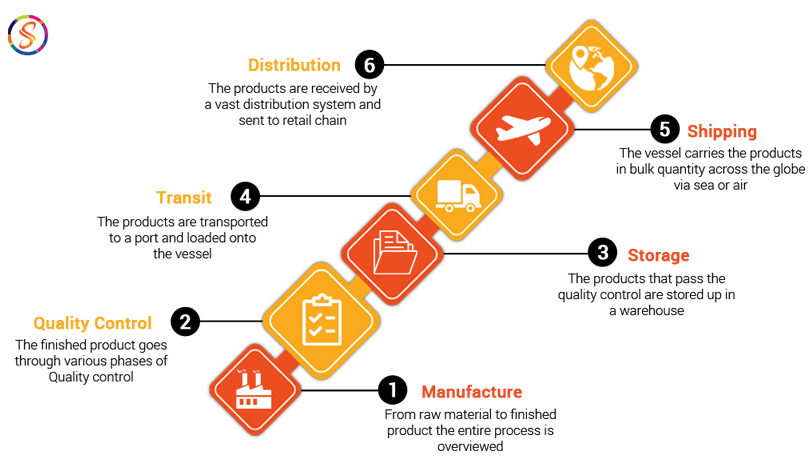Scala Blockchain
Blockchain for Shipping and Logistics
Shipping and logistics which make up a huge chunk in the supply chain is slowly and steadily moving towards automations as the challenged faces in the said sector are increasing on a daily basis. Though the communication technological advancements are fueling the evolution of the industry, it still falls behind with some issues faced. This has driven the industry to open mindedness and readiness to imbibe any new technology that can pitch in to resolve the occurrences and make the said sector better.
Shipping involves resource plan, organizing, management of trailers across the carrier’s offices, control and execution of the transportation of shipped items. Logistics initially started with the military; as it was used to operate and supply the military with ammunition, arms, rations and other supplies.
Logistics management being a part of supply chain that governs business of freight shipping with all its vital needs; It also ensures implementation and control of shipping and freight business that would provide the most effective and efficient results.
 Almost 90% of goods in international trade are undertaken by the ocean shipping industry. However, the supply chain is slowed by the complexity and sheer volume of point-to-point communication across a loosely coupled web of land, air and sea transportation, freight forwarders, governments, ports and ocean carriers. Global trading parties require both improved and automated workflow and better visibility. The industry is in need of a faster, secure and efficient ways to handle documentation process required to move goods across international borders. The main challenge faced in the industry is that a single vessel can carry thousands of shipments, and on top of the costs to move the paperwork, the documentation to support it can be delayed, lost or misplaced, leading to further complications.
Almost 90% of goods in international trade are undertaken by the ocean shipping industry. However, the supply chain is slowed by the complexity and sheer volume of point-to-point communication across a loosely coupled web of land, air and sea transportation, freight forwarders, governments, ports and ocean carriers. Global trading parties require both improved and automated workflow and better visibility. The industry is in need of a faster, secure and efficient ways to handle documentation process required to move goods across international borders. The main challenge faced in the industry is that a single vessel can carry thousands of shipments, and on top of the costs to move the paperwork, the documentation to support it can be delayed, lost or misplaced, leading to further complications.
Shipping and logistics management face huge challenges to develop solutions for all shipping needs, varying from fossil fuel to labor. Also, shipping and logistics management include finding solutions for the environmental impact of increased consumption of fossil fuels that is big negative. It also has concerns with security and safety of the transported items. Shipping and logistics also management extends to the coordinating of fleet of vehicles used in shipping process. By using GPS vehicle tracking systems it becomes easy to increase the productivity of the fleets and decrease fuel consumption.
Blockchain in shipping and logistics- What’s new?
Blockchain being an immutable, secure and transparent shared ledger and network provides all parties involved end-to-end visibility based on their level of permissions. Each party in a supply chain ecosystem can view and be aware of the progress of goods through supply chain like understanding where a container is in transit. They can also view bills, see the status of customs documents, bills of lading and other such data. Detailed visibility of the container’s progress through the supply chain is enhanced with the real time exchange of original supply chain events and documents No one party can delete, modify or even append any record without the consensus from others on the network.
What we offer
Scala Blockchain solutions for shipping and logistics allows for a level of transparency in the process, which in real-time
- Provides selective transparency among the parties involved
- Reduce errors and frauds
- Digitalization of authorization and other documents
- Reduce the product’s transit time and shipping process
- Improve the inventory management
- Allow for transit tracking
- Reduce wastage and costs
- View required documentations on a public ledger
- Status of clearance details
